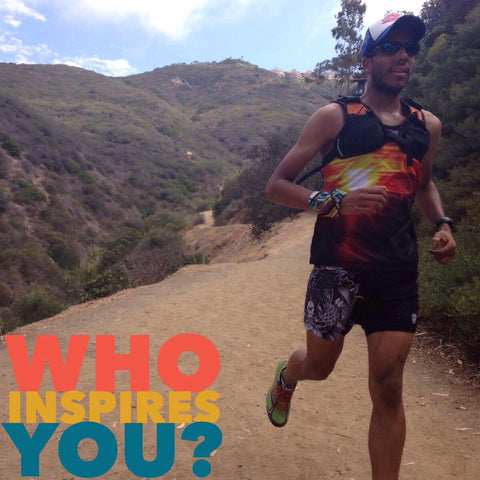Linzie's body gave out at mile 18 during the Ventura Marathon, yet he pushed onward. Hear his story on what it takes to keep going when your body screams, "NO!"

Running a marathon is one of the most physically challenging activities you can do. And most rewarding.
While we are not all training for a literal marathon, we each have arduous or daunting goals we are striving for -- and it is in this shared quest that our journey's intertwine. The marathon is simply a totem for a target that looms large, off in the distance, to be pursued one small step at a time. But, how do you get there? What does it take? How do you mentally steel yourself for the road ahead?
Today, we talk with Linzie Starr of Sharp Endurance about his most recent marathon -- and the challenges he faced when his body gave way 2/3rds into the race.
About Linzie
Linzie Starr is (now) a Southern Californian endurance sports athlete who stumbled upon his love of running. In 2011, he embarked on his running journey simply to be more active, spurred in part because his family has a history of diabetes -- but largely instigated as a way to blow off steam from work. Growing up, he was not much of an athlete and never saw himself as a runner. Yet, after his first jog around his neighborhood, he instantly realized that he began feeling more alive and spirited... and to his astonishment, that he actually enjoyed the run!
In May of 2012 he ran his first half marathon in Orange County, California, and has been hooked ever since. He's since run more than 15 marathons, including the Boston Marathon, and more than 25 half marathons. And it is all this training and striving that helped Linzie overcome his most recent hurdle at the Ventura Marathon.

Mindset of a Marathoner
No matter what we are focusing on, our mindset will largely dictate whether we succeed or not. What can we learn from Linzie's story of overcoming adversity, and how can we apply that to each of our journeys? Let's learn more:
CogniTea: Tell us about the Ventura Marathon; you were aiming to PR, on pace for 3:55. Things were going well… then mile 18 hits. What happened?
Linzie: "This was my second year running the Ventura Marathon. In 2013, when I ran this race I actually had an ear infection onset right in the middle of the race and was forced the walk the second half. That’s a long walk when you’re in pain.
This year I was determined to return and do better. Ventura is a flat and fast course so it’s a great place to open the thrusters and show what you’re made of. The first half of the race was incredible. I was focused, determined, and knew what my game plan was. Around mile 18 my right hip flexor decided it didn’t want to participate."
Walk us through the experience: When did you first know something was up? What did you feel physically? What was going through your mind?
"I knew something was off around mile 16. I thought it was typical muscle fatigue. I realized what was going on and had an aloud discussion with my body. I do that when I run, I talk to my body... [it] helps me with the thought process. What went through my mind is, 'okay...you’re starting to fatigue and get tight... modify it up but do not stop moving.'"
You decided to push onward, how did you resolve to yourself to keep going?
"I don’t quit. This was my 15th marathon. If I didn’t quit during an extreme weather warning and downpour in Florida in February (HI KATIE); if I didn’t quit on Heartbreak Hill during the Boston Marathon in April (HI ADAM); then there was NO WAY I was going to quit on this course because my hip flexor decided it would rather have a Dr. Pepper and not play. So I focused on getting to the finish, and celebrate the miles that went well.
Every run teaches you something, in my opinion there is never a failure if you started!"

Tell us about actual journey of the next 8 miles. That’s still a long distance to go. Break it down: What were the tactics that you used to get through the remaining miles? Did you formulate a plan? What are you thinking about?
"Yeah it is a long way to go! LOL. My tactic was simple: Don’t. Stop. Moving. I already knew the goal finish time was gone... so now it was about getting to the finish with a time I am proud of. I was thinking about moving forward. I was thinking about how happy I was with my race even though I was hurting. I was thinking of that delicious double cheese burger with all the bacon waiting for me as my reward at the Camarillo Airport restaurant, Way Pointe Cafe. I think about food a lot."
How, if at all, did your original goal impact your mindset or approach?
"You always keep your goal in sight. But after I saw it pass, the goal changed. I said, 'Ok...that original plan isn’t gonna happen...so what’s next?' I just readjusted my goal and pushed toward that [new goal] based on how I felt."
It seems like you have a really positive and resilient mindset, have you always had this mindset, this resilience? How have you cultivated this over the years? Do you do any mental training, mindfulness or meditation?
What advice would you give to others to develop this powerful mindset?
Going forward, how are you going to alter your approach for your next marathon? What are you evaluating and how do you plan on adapting your training?
What are you working towards now? How can the CogniTea Community help?





